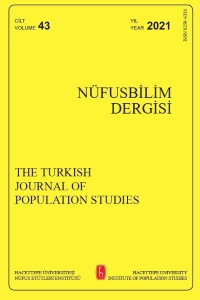TÜRKİYE’DE DEMOGRAFİK FIRSAT PENCERESİ VE EĞİTİMİN YAYGINLAŞMASININ SOSYOEKONOMİK ETKİLERİ
Bu makalede Türkiye’de demografik geçiş ve eğitimin yaygınlaşmasının sosyal ve ekonomik etkileri değerlendirilmektedir. Türkiye’nin yüksek genç nüfus oranı ile açık olan demografik fırsat penceresi ve son yıllarda gerek ilköğretim gerekse yükseköğretimde hızla artan okullaşma oranlarının ne gibi fırsatlar doğurduğu, bu fırsatların değerlendirilmesi için gerekli koşulların neler olduğu, bu fırsatların yarattığı hedeflere ulaşmada sosyal ve ekonomik engellerin neler olduğu tartışılmaktadır. Bu bağlamda, Türkiye’nin orta gelir grubundan yüksek gelirli ülke grubuna çıkması olanağı, istihdam piyasasının değişen yapısı ve toplumsal tabakalaşmada yaşanan değişiklikler ele alınmıştır. Yapılan incelemeler hem eğitim hem de istihdam alanında çeşitli olumlu niceliksel ilerlemelerin olduğunu göstermektedir. Ancak yine de pek çok göstergede Türkiye’nin gelişmiş ülkeler düzeyinin altında kaldığı görülmektedir. Ayrıca, niceliksel ilerlemenin niteliksel iyileşmeleri sağlayacak politikalarla desteklenmesi gerekliliği de ortaya konmuştur.
Anahtar Kelimeler:
Demografik fırsat penceresi, eğitimin yaygınlaşması, genç işsizliği, orta gelir tuzağı, toplumsal tabakalaşma
SOCIO-ECONOMIC EFFECTS OF THE DEMOGRAPHIC WINDOW OF OPPORTUNITY AND EDUCATIONAL EXPANSION IN TURKEY
In this article, social and economic effects of demographic transition and educational expansion in Turkey are evaluated. The opportunities created by the young population and demographic window of opportunity and by the increasing rates of enrolment both in primary and tertiary education, the requirements for fulfilling these opportunities, and the social and economic obstacles for reaching the goals set by these opportunities are discussed. In this sense, the potential of Turkey for advancing to upper income group, the changing structure of the employment market and the changes in the social stratification are analysed. Evaluations of these reveal that there are various quantitative advancements both in education and employment. However, Turkey still lags behind developed countries in terms of various indicators. Moreover, it is considered that quantitative progress should be partnered with policies aiming qualitative improvements.
Keywords:
Demographic window of opportunity, educational expansion, youth unemployment, middle income trap, social stratification,
___
- Akgündüz, D. (2016). A research about the placement of the top thousand students in STEM fields in Turkey between 2000 and 2014. Eurasia Journal of Mathematics, Science and Technology Education, 12(5), 1365–1377
- ISSN: 0259-6334
- Başlangıç: 1979
- Yayıncı: Hacettepe Üniversitesi
Sayıdaki Diğer Makaleler
TÜRKİYE’DE GÖÇÜN DEĞİŞEN YAPISI KAYNAKLI İKİ OLGU
KOMŞUDAN YABANCIYA, MİSAFİRDEN MÜLTECİYE: YEREL HALKIN GÖZÜNDEN TÜRKİYE’DE MÜLTECİLER
Helga RITTERSBERGER-TILIÇ, Sevil BAL
GECEKONDU MAHALLELERİNDE SÜREĞEN GÖÇMENLİK HALLERİ: LİMONTEPE ÖRNEĞİ
HAYATİ KAYITLARDAN TÜRKİYE İÇİN HAYAT TABLOSU n ax DEĞERLERİNİN HESAPLANMASI: 2010-2018
